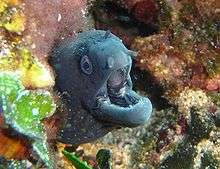Muraena
Muraena is a genus of twelve species of large eels in the family Muraenidae.
| Muraena | |
|---|---|
 | |
| Scientific classification | |
| Kingdom: | Animalia |
| Phylum: | Chordata |
| Class: | Actinopterygii |
| Order: | Anguilliformes |
| Family: | Muraenidae |
| Subfamily: | Muraeninae |
| Genus: | Muraena Linnaeus, 1758 |
| Species | |
|
See text. | |
This genus is common in the Mediterranean, and is abundantly represented in tropical and subtropical seas, especially in rocky parts or on coral reefs. In the majority, a long fin runs from the head along the back, round the tail to the vent, but all are destitute of pectoral and ventral fins. The skin is scaleless and smooth, in many species ornamented with varied and bright colours.[2]
The mouth is wide, the jaws strong and armed with formidable, generally sharply pointed, teeth, which enable the Muraena not only to seize its prey (which chiefly consists of other fishes) but also to inflict serious, and sometimes dangerous, wounds on its enemies. It attacks persons who approach its places of concealment in shallow water, and is feared by fishermen.[2] At least one species, Muraena retifera, possesses an additional "raptorial pharyngeal jaw" within the pharynx, which is mobile and can be thrust forwards quickly to assist in grasping prey.[3]
Some of the tropical Muraenas exceed a length of 5 feet (150 cm), but most of the species, among them the Mediterranean moray, are somewhat smaller. The latter, the "murena" of the Italians and the Muraena helena of ichthyologists, was considered by the ancient Romans to be one of the greatest delicacies, and was kept in large ponds and aquaria. It is not confined to the coasts of southern Europe, but is spread over the Indian Ocean, and is not uncommon on the coasts of Australia. Its body is generally of a rich brown, marked with large yellowish spots, each of which contains smaller brown spots.[2]
Species
- Muraena appendiculata (Guichenot, 1848)
- Muraena argus (Steindachner, 1870) (White-spotted moray)
- Muraena augusti (Kaup, 1856)
- Muraena australiae J. Richardson, 1848
- Muraena clepsydra C. H. Gilbert, 1898 (Hourglass moray)
- Muraena helena Linnaeus, 1758 (Mediterranean moray)
- Muraena lentiginosa Jenyns, 1842 (Jewel moray)
- Muraena melanotis (Kaup, 1860) (Honeycomb moray)
- Muraena pavonina J. Richardson, 1845 (Whitespot moray)
- Muraena retifera Goode & T. H. Bean, 1882 (Reticulate moray)
- Muraena robusta Osório, 1911 (Stout moray)
References
- Sepkoski, Jack (2002). "A compendium of fossil marine animal genera". Bulletins of American Paleontology. 364: 560. Retrieved 2008-01-08.
-

- "For moray eels, two jaws better than one - Environment - smh.com.au". Sydney Morning Herald.
- Froese, Rainer and Pauly, Daniel, eds. (2011). Species of Muraena in FishBase. June 2011 version.